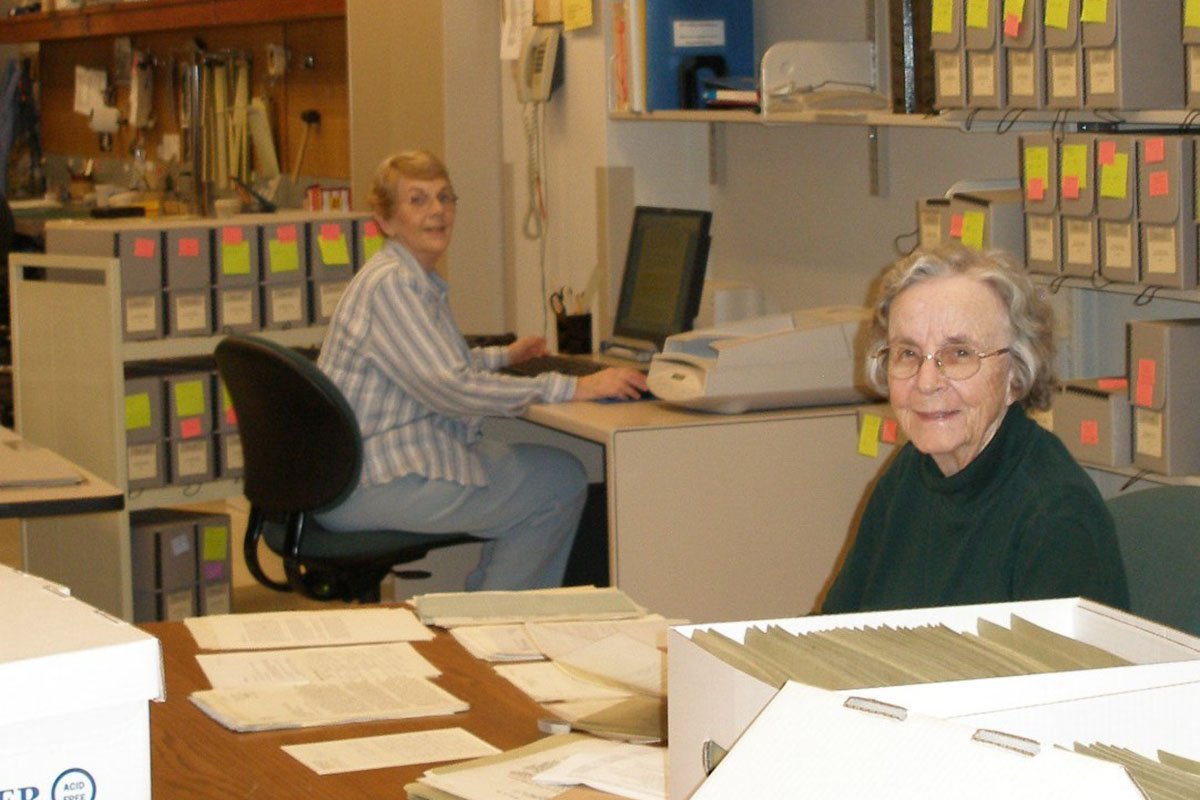 Retired faculty members Ellin Kelly (left) and Pat Wagner arrange and describe collections from the DeAndreis-Rosati Memorial Archives in spring 2006. (Image courtesy of Special Collections and Archives)
Retired faculty members Ellin Kelly (left) and Pat Wagner arrange and describe collections from the DeAndreis-Rosati Memorial Archives in spring 2006. (Image courtesy of Special Collections and Archives)
This year marks the 20th anniversary of the DeAndreis-Rosati Memorial Archives, the records of the Western Province of the Congregation of the Mission, arrival at DePaul. This essay is the first in a two-part series and describes the origins and relocation of the DMRA.In 1939, the Rev. William M. Brennan, C.M., Superior of St. Mary's of the Barrens Seminary in Perryville, Missouri, encouraged Vincentian seminarians to preserve and record the history of the founders and co-laborers of our Congregation in the United States. Fr. Brennan's suggestion inspired the students to establish a memorial archives, named in honor of the two Italian Vincentians, Felix De Andreis and Joseph Rosati, who led the first group of Congregation of the Mission priests and brothers from Europe to America in 1816.
Notes outline the objectives of the students who received approval from the Provincial Superior, Rev. Marshall F. Winne, C.M. to gather and preserve documents and historical materials. Contributors who wrote profiles of early Vincentians and descriptions of significant places or events for the seminary's student newspaper, “The DeAndrein," often refer to the archives as “treasures." Students who worked in the archives were dedicated and aware of the importance of their projects.
“By reason of the increase of new parishes and seminaries in the past few years, it has been found necessary to reorganize existing material. It has also been found to be an increasing formidable task to keep up with the provincial expansion. Confreres can be of great service to the building up of a valuable archive by sending news items, publications, and other material pertaining to the province. Such information will be valuable to future researchers." ("The DeAndrein," April 1958).
The commitment by Vincentian archivists to collect and index materials documenting the Western Province of the Congregation continued until 2001, when the DRMA were transferred to the DePaul University Library.
The journey of the archives moving to DePaul began in 1985 when seminary operations at St. Mary's of the Barrens closed due to declining enrollments, lack of vocations and a change in how the province structured education and training. Nearly 10 years after the closure, a task force evaluated the assets, activities and personnel, and determined the administration of the community archives were no longer integral to the mission of St. Mary's.
This decision was not universally embraced by those who worked closely with the historical materials and who had plans to develop a heritage center on the grounds. The Rev. Edward Udovic, C.M., was assigned to advise the provincial council on the historical collections and provided carefully considered ideas designed to help the Vincentians in Perryville accept the decision.
“The archives are and will remain the sole property of the Province. They are only being moved and housed at DePaul," Fr. Udovic wrote in his 1995 implementation plan.
Those who did not agree with the recommendation maintained there was a distinction between the house archives and the community archives, and asked for time to sort the archives accordingly. When the Province administration signed a contract to lease the building housing the seminary library, museum collections, and community archives to Southeast Missouri State University in November 2001, the Vincentians in Perryville finally had to accept the move of their beloved treasures to Chicago would no longer be delayed.
Nearly 800 linear feet of documents stored in boxes, crates and file cabinets arrived in April 2001. Staff embarked on the library's plan to develop the collection's scholarly potential in collaboration with members of the Western Province of the Congregation of the Mission.
Two retired DePaul faculty, Ellin Kelly, Department of English (1968 – 92) and Pat Wagner, School of Nursing (1962 – 93), worked closely with library staff for more than a decade to organize and describe the bulk of the provincial, seminary, parish and personnel records.
To transform the indexing system used by Vincentians in Perryville to professional standards, the team also had assistance from the library's metadata and cataloging department, students interested in learning how to arrange and describe archival collections. The team's ability to respond to inquiries, integrate primary sources into instruction and exhibit programs, and connect staff and Vincentian Studies Institute research grant recipients to the collections would not have been possible without the volunteers and interns.
If you have questions about accessing these materials please contact Morgen MacIntosh Hodgetts, coordinator of Special Collections and Archives Engagement.